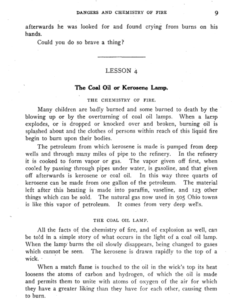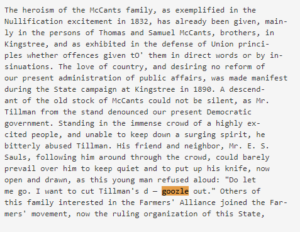We’ve compiled some tidbits of information on these Appalachian English words. Some information is extensive, telling the first usage and a little etymology. Other information is sparse. Still other information is somewhat entertaining.
1. Coal oil:
b.) kerosene

- From “How is Lamp Oil Made?” by Alex Burke on the website hunker:
Lamp oil . . . is a petroleum-based oil that is refined to burn in an odorless, soot-free manner. The lamp oil, or fuel, is referred to as kerosene or paraffin (not paraffin wax). Paraffin (kerosene) is a hydrocarbon and is considered a low-temperature fuel. Refined from petroleum and cheap to make, paraffin oil was first distilled from asphalt in the early 1800s.
- Merriam Webster:
The first known use of the words “coal oil” was in 1859, defined as “petroleum or a refined oil prepared from it.”
- Collins Dictionary:
The words “coal oil” is listed as being in use as early as 1808, (probably in Britain (England)).
![]()
2. Galluses:
c.) suspenders

Lexico, Oxford powered dictionary:
“Mid-19th century,” “Scottish”
![]()
3. Retch:
d.) reach
Lexico, Oxford powered dictionary: “Old English rǣcan, of West Germanic origin; related to Dutch reiken and German reichen”
Online Etymology Dictionary lists reichen as Old High German, meaning “to reach, to pass, to hand, to give; to be sufficient.” Perhaps, once Germans came to the New World, the word changed linguistically after being exposed to different dialects (Irish, Scottish, and even Dutch).
![]()
4. Year:
b.) ear
Origin for “ear”
Lexico, Oxford powered dictionary: “Old English ēare, of Germanic origin; related to Dutch oor and German Ohr, from an Indo-European root shared by Latin auris and Greek ous.”
![]()
5. Eat Up:
a.) all over
Information on the origin of this specific phrase was not found.
![]()
6. Pooch(ed)/ Pooch(ed) out:
c.) protruding
Lexico, Oxford powered dictionary: Protrude or cause to protrude; Dates back to Mid-17th century from the noun pouch.

7. Backset:
b.) relapse in sickness
Merriam Webster Dictionary: first known use of “backset” is in 1722, meaning “setback”
Collins Dictionary lists the word as being used as early as the mid-1500s.

8. Dope:
c.) carbonated beverage
Word History: The word dope originated in American English and is a borrowing of the Dutch word doop, “sauce.” (New York City was once a Dutch colony, New Amsterdam, and many words originally distinctive to American English, like boss and cookie, were borrowed from Dutch colonists in the region.) Throughout the 1800s, dope meant “gravy,” and in the North Midland United States, particularly Ohio, dope is still heard as the term for a topping for ice cream, such as chocolate syrup or fruit sauce. Also in the 1800s, the meaning of dope was extended to include various medicinal mixtures or syrups, including the syrups from which soda-fountain drinks like Coca-Cola were prepared. A continuation of this usage survives in the South, particularly in South Carolina, where dope refers to the carbonated soft drink that elsewhere in the United States is called cola.

9. Gaum:
a.) a mess
Merriam Webster Dictionary: First known use of gaum was in 1656, defined as smudge; smear; of unknown origin

10. Sweet Milk:
b.) regular milk; not buttermilk
Lexico, powered by Oxford: Fresh whole milk, as opposed to buttermilk.

11. Case Knife:
a.) dinner knife
Definition of case knife
1: SHEATH KNIFE
2: a table knife
Collins Dictionary:
Sheath Knife = British English
Sheath Knife/ Table Knife = American English – Word Origin 1695-1705

12. The Grip:
c.) the flu
First known use of grippe: 1776, defined as “an acute febrile contagious virus disease; especially influenza”
History and Etymology for grippe: French, literally, seizure
The Spanish Flu (1918) was called La Grippe
grippe (n.)
“epidemic influenza,” 1776, probably from French grippe “influenza,” originally “seizure,” verbal noun from gripper “to grasp, hook,” from Frankish or another Germanic source, from Proto-Germanic *gripanan . . . Supposedly in reference to constriction of the throat felt by sufferers; the word spread through European languages after the influenza epidemic during the Russian occupation of Prussia in the Seven Years’ War (c. 1760).

13. Tradin’:
a.) grocery shopping
trade (v.)
1540s, “to tread a path,” from trade (n.). Meaning “to occupy oneself (in something)” is recorded from c. 1600. Meaning “to barter” is by 1793 . . . Related: Traded; trading. To trade down is attested from 1942; trade up from 1959. Trade places “exchange situations” is from 1917. Trading post is recorded from 1796. Trading stamp, given by merchants and exchangeable for goods, is from 1897.

14. Loaferin’
c.) taking it easy
Merriam Webster for “loafer”:
First Known Use of loafer – 1830, in the meaning defined as “idler,” may be short for landloafer, from German Landläufer tramp, from Land + Läufer runner
Lexico for “loafer”:
“Mid-19th century perhaps from German Landläufer ‘tramp’, from Land ‘land’ + laufen (dialect lofen) ‘to run’.”

15. Garntee/ garnt tee:
b.) Guarantee
Lexico for “guarantee”: “Late 17th century (in the sense ‘guarantor’): perhaps from Spanish garante, corresponding to French garant (see warrant), later influenced by French garantie ‘guaranty’.”
guarantee (n.)
1670s, “person that gives security,” altered (perhaps via Spanish garante or confusion with legalese ending -ee), from earlier garrant “warrant that the title to a property is true” (early 15c.), from Old French garant “defender, protector; warranty; pledge; justifying evidence,” from a Germanic source . . .
guarantee (v.)
1791, “to be surety for,” from guarantee (n.). Garanten in this sense is from early 15c. Related: Guaranteed; guaranteeing.

16. Untellin’:
a.) Unknown; who knows?
Anglo-Saxon dictionary: Untállic – blameless. Uncertain if this links with “untellin'” but it is interesting.
The word could also be a shortened form of the phrase, “there’s no telling,” which, according to Dictionary.com, means “it’s impossible to determine.” The dictionary explains further: “This idiom uses telling in the sense of ‘reckoning,’ a usage dating from the late 1300s.”

17. Stove(d) Up:
b.) sore
Merriam Webster Dictionary: “from past participle of stave up”
Lexico, powered by Oxford: “Middle English back-formation from staves, archaic plural of staff.” Some uses date from the early 17th century.
Grant Barrett posted on the radio show, A Way with Words, that “stove” in “stove up” is “the past tense of stave. To stave in a wooden boat is to smash a hole in its side, and thus, to be stove up is to be incapacitated or damaged.” A short recording (less than five minutes) is on the site and further discusses the word.

18. Goozle:
d.) throat

The Dictionary of American Regional English lists “goozle” as “the throat as a whole, or spec the gullet, windpipe, or Adam’s apple.”

19. Rurnt:
b.) ruined
Little information about the pronunciation of this word could be found, other than it being a possible variation of the Scottish word, rewinit.

20. Jar Fly:
d.) Cicada
According to an article by Keith930, entitled “The Sound of August: Jar Fly? Cicada? Or Locust?”, two possible reasons exist for the nickname “jar fly.” The first reason is, when you catch one, it shakes, or “jars” your hands. The second reason given is that the incessant noise jars the ears. Our chief editor was told this reason: when you catch one and keep it in a jar as a pet, it makes a cool “tincan” noise.
**Featured Image Source: by Gerhard G./ blende12 at Pixabay

Missed eight. I don’t think I passed unless you might grade of the curve!